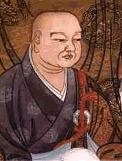Our website is made possible by displaying online advertisements to our visitors.
Please consider supporting us by disabling your ad blocker.
Keizan
Keizan Jōkin Zenji | |
|---|---|
 | |
| Title | Zen Master Daishi |
| Personal life | |
| Born | Keizan Jōkin 1268 |
| Died | 1325 (aged 56–57) Japan |
| Other names | Taiso Jōsai Daishi |
| Religious life | |
| Religion | Zen Buddhism |
| School | Sōtō |
| Senior posting | |
| Predecessor | Tettsū Gikai |
| Successor | Meihō Sotetsu |
Students
| |
| Part of a series on |
| Zen Buddhism |
|---|
 |
Keizan Jōkin (Japanese: 瑩山紹瑾, 1268–1325), also known as Taiso Jōsai Daishi,[1][self-published source] is considered to be the second great founder of the Sōtō school of Zen in Japan. While Dōgen, as founder of Japanese Sōtō, is known as Highest Ancestor (高祖, kōso), Keizan is often referred to as Great Ancestor (太祖, taiso).[2]
Keizan and his disciples are credited with beginning the spread of Sōtō Zen throughout Japan, away from the cloistered monastic practice characteristic of Dōgen's Eihei-ji and towards a more popular religion that appealed to all levels of Japanese society. Keizan founded several temples during his lifetime, most notably Yōkō-ji and Daihonzan Sōji-ji (founded on the Noto Peninsula and moved to Tsurumi-ku, Yokohama in 1911). Today Sōji-ji and Eihei-ji stand together as the two principal Sōtō Zen training centers in Japan.
- ^ Pussel, Ryofu (2010). A Critical Analysis of the Buddhist 88-Temple Pilgrimage on Shikoku Island. Xlibris. p. 39. ISBN 978-1-4535-3665-0.
- ^ Heine, Steven (2008). Zen Skin, Zen Marrow: Will the Real Zen Buddhism Please Stand Up?. Oxford University Press. p. 88. ISBN 978-0-19-532677-2.
Previous Page Next Page


